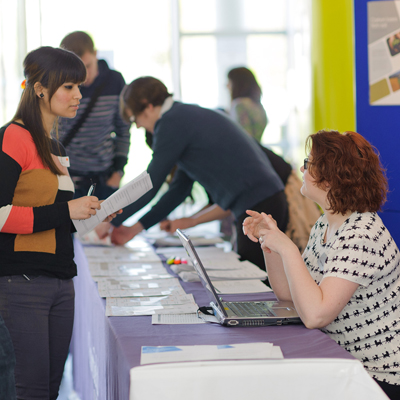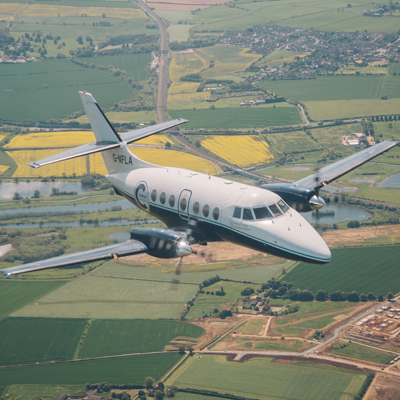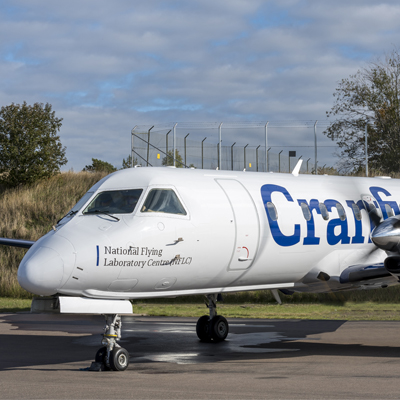Cranfield University’s National Flying Laboratory Centre’s (NFLC) fleet expansion became a reality this month with the transfer of ownership of its latest asset, a Saab 340B aircraft.
The University has been fundraising this year for a replacement to their ageing Jetstream 31, which operates from Cranfield’s Global Research Airport. The facility is unique in the UK by providing aerospace engineering students from over 20 Universities and Cranfield with invaluable flight test experience as a flying classroom.
Further funding is needed in order to complete the modifications of the aircraft to support the next generation of aero-engineers. Being larger than the Jetstream 31, the Saab 340B will allow the NFLC to accommodate more students on each flight and create new research capabilities, including potentially in collaboration with other universities. The flying laboratory also undertakes research projects testing the development of aerospace technologies and flight operations.
Helen Atkinson, Pro-Vice-Chancellor - School of Aerospace, Transport and Manufacturing said: “Students get to experience for themselves what they have studied and it brings their calculations to life. Its invaluable experience and provides graduates with the skills required for careers in aerospace.
“A number of stakeholders who employ graduates, including some of the UK’s leading aerospace companies and many of the universities who fly with us, have already agreed to help us towards our fundraising target - along with the major upfront commitment from Cranfield itself. Now we need our friends and alumni to help us to complete our fundraising campaign for this important national flying laboratory and classroom.”
This week, the University announced it had been awarded its sixth Queen’s Anniversary Prize for its work supporting the nation’s aero-engineering students through the use of the NFLC facilities. The Queen’s Anniversary Prizes are the UK’s most prestigious form of national recognition open to a UK academic or vocational institution.
The modifications to ensure the aircraft is upgraded from a standard commercial plane to a fully bespoke facility, with all the technical equipment necessary to ensure the testing of the boundaries of aviation, continues at Saab in Sweden. Its delivery to Cranfield University is expected mid-2020.
The relationship between Saab and Cranfield is well established with the University opening the first UK digital control tower at Cranfield Airport in December 2018. Supplied by Saab Digital Air Traffic Solutions, the innovative technology replicates what can be seen through the windows of a traditional air traffic control tower. Saab is also a partner in the Digital Aviation Research Technology Centre (DARTeC) under construction at Cranfield.
About Cranfield University
Cranfield University is a specialist postgraduate university that is a global leader for education and transformational research in technology and management.
Transport Systems at Cranfield
Cranfield has over 50 years’ experience in transport, including the aviation, automotive, motorsport, military and marine sectors.
We are the only university in Europe to own and run an airport and to have airline status.
Our education and award-winning research covers all modes of vehicles and transport across technology, engineering and management, including sustainable transport and intelligent mobility.
In an increasingly interconnected world, we specialise in understanding the whole environment in which transport operates: the vehicles, infrastructure, businesses and logistics, as well as the human aspects of operating, managing and using transport.
Our world-class facilities include high-performance wind tunnels, an off-road vehicle dynamics facility, a crash impact test centre (one of just three FIA (Federation Internationale de l’Automobile) approved test centres in the world) and our Accident Investigation Laboratory, which is dedicated to our work in aviation, marine and rail safety and the only accident investigation laboratory of its type outside the United States. We were awarded the Queen’s Anniversary Prize for our world-leading work in aviation safety through research and training in air accident investigation in 2011.
Completed in 2017, our latest facility, the Multi-User Environment for Autonomous Vehicle Innovation, is a £19 million ‘smart’ roadway test environment for the development of intelligent and autonomous vehicles, making it a UK first. It includes the associated systems needed to integrate emerging technologies into our day-to-day lives.
A new £65 million Digital Aviation Research and Technology Centre will also be built at Cranfield to spearhead the UK’s research into digital aviation technology, and a new state-of-the-art digital control tower, which replicates what can be seen through the windows of a traditional air traffic control tower via a live feed using HD cameras and sensors, is being installed at Cranfield Airport.










